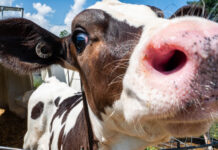While officials in Washington stare at a federal budget proposal headed nowhere and a federal budget deficit headed to the moon, farm leaders in rural America are closely watching two recent moves into Big Ag by Big Retail.
In mid-2018, Walmart, the Arkansas retailing giant, began bottling milk in a newly built facility near Fort Wayne, Indiana, for its 500 stores in Michigan, Illinois, Ohio, Kentucky and Indiana.
In doing so, this newcomer shoved an industry veteran, Dean Foods, its former bottler, out the door. With Dean went 100 or so dairy farmers in surrounding states who sold milk to it.
Walmart replaced all with just 30 farmers and cooperatives within 140 miles of its new plant.
At the same time, 650 miles west, Costco, “a membership-only warehouse” club second only to Walmart in global retail sales, began to assemble a feathery empire near Fremont, Nebraska, that will grow, slaughter and distribute 2 million whole chickens a week to be sold as “cooked rotisserie chicken” in all Costco stores west of the Mississippi River.
To pull this off, Costco has recruited an estimated 100 to 125 Nebraska and Iowa farmers to, on average, build four specialized poultry barns to grow 200,000 birds every seven or so weeks.
For Costco contract growers, their $800,000 to $1 million investment per setup is a way to both boost cash flow during the latest commodity low-price cycle and bring a younger generation into their farming operations.
Groundbreaking venture
While neither venture looks particularly risky for either the retailers or the producers — all are under contract at what outsiders say presently are profitable prices — they are groundbreaking in other ways.
First, each of the fully integrated enterprises hopes to eliminate all the usual middlemen — anyone who sells inputs to food processors or packagers, as well as distributors and wholesalers — between the originating farmer and the final customer.
Costco, for example, has effectively eliminated suppliers like Tyson Foods and Pilgrim’s Pride (and their opaque pricing structures) by building a captive supply chain right down to its own feed plant, slaughtering plant and transportation system.
Similarly, Walmart has Walmart-contracted truckers hauling Walmart-contracted milk to a Walmart bottling plant that Walmart will then process and haul to Walmart stores on Walmart trucks to sell directly to Walmart customers.
That’s an airtight form of vertical integration rarely seen in U.S. agriculture and never seen on that scale.
Current livestock integrators do own feed mills, slaughtering plants and transportation systems.
Few, however, retail their products directly to customers.
By closing that loop and managing every link of the production-to-plate supply chain, Costco and Walmart now have direct control of their products’ production, quality, price and profit.
And somewhere along the way, they became farmers, because without their massive market clout and integrative downstream muscle, thousands of cows wouldn’t be milked in Michigan and Indiana, and few chickens would ever be found scratching around Fremont, Nebraska.
Integration
Will Walmart and Costco effectively and profitably integrate their food supply chains from the farm to the shopping cart?
It’s an open question, but both are starting with products that require minimum handling and little processing to become table-ready “food.”
Also, milk and chicken are traditional retail “loss leaders” — low-margin, everyday items stores sell cheaply to entice shoppers into their stores to likely buy higher margin items.
If it does work — and profit-pinched farmers and ranchers, with open eyes and access to ample credit, become contract producers — consumers and farmers alike can expect to see more of it, says John Hansen, president of the Nebraska Farmers Union.
“The reason is simple,” he says. “The integrators control quality, production, costs, distribution and profit. It’s the natural extension of the corporate state.”
Farmers on the other hand, warns Hansen, need to be more wary of this route than they currently are today.
“I have said that farmers who sign these contracts are volunteering to get run over by a bus because total integration means the total elimination of markets. The integrators become the only market.”
And when you have only one market, there is, in fact, no market.















Good read, Alan!
As you mention: “Let the Producers Beware!”
One minute the huge chain love you, the next minute you’re out the door. Then what…
While most times this author is often not correct on agricultural happenings, he is dead-correct on this article. Huge monopolies are taking over agriculture-pushing out the competition. Of course, they encourage severe government over-regulation, making things far too costly for small processors/on-farm processing to enter. Dean foods is just as evil as Walmart and Costco, however. They literally BULLY farmers into doing what they want-‘either you do things our way or we wont buy your products’, all the while smirking because they know food processors have become virtually all monopolized and that there is no other processor to buy ag products. In the gospels of Matthew, Mark, and Luke, as well as the Revelation of John, we are warned by Jesus and his angel that there will be food shortages and starvation. How can this be when food has become the most abundant, safest, and cheapest in the history of mankind?? FOOD CONTROL. That is exactly what is happening. Wake-up people-things will happen quickly-‘as a thief in the night’. This is far more than an industry problem!!